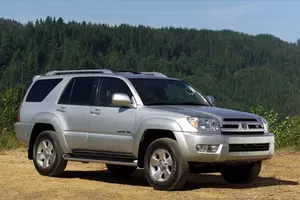
| Vehicle | Precise engine size | Difference from world average | Engine size to consumption ratio | Horsepower from 1 L | Engine size to 100 kg of weight |
|---|---|---|---|---|---|
| 4.0 V6 24V |
3.96 L (3956 cc) |
68.6% bigger | 220 cc to 1 mpg | 68 hp from 1 L | - |
| Vehicle | 4.0 V6 24V |
|---|---|
| Precise engine size | 3.96 L (3956 cc) |
| Difference from world average | 68.6 bigger |
| Engine size to consumption ratio | 220 cc to 1 mpg |
| Horsepower from 1 L | 68 hp from 1 L |
| Engine size to 100 kg of weight | - |

| Vehicle | Precise engine size | Difference from world average | Engine size to consumption ratio | Horsepower from 1 L | Engine size to 100 kg of weight |
|---|---|---|---|---|---|
| 4.0 V6 24V |
3.96 L (3956 cc) |
68.6% bigger | 208 cc to 1 mpg | 68 hp from 1 L | 188 cc to 100 kg |
| 2.7 16V |
2.69 L (2694 cc) |
14.8% bigger | 135 cc to 1 mpg | 58 hp from 1 L | 142 cc to 100 kg |
| Vehicle | 4.0 V6 24V |
|---|---|
| Precise engine size | 3.96 L (3956 cc) |
| Difference from world average | 68.6 bigger |
| Engine size to consumption ratio | 208 cc to 1 mpg |
| Horsepower from 1 L | 68 hp from 1 L |
| Engine size to 100 kg of weight | 188 cc to 100 kg |
| Vehicle | 2.7 16V |
| Precise engine size | 2.69 L (2694 cc) |
| Difference from world average | 14.8 bigger |
| Engine size to consumption ratio | 135 cc to 1 mpg |
| Horsepower from 1 L | 58 hp from 1 L |
| Engine size to 100 kg of weight | 142 cc to 100 kg |

| Vehicle | Precise engine size | Difference from world average | Engine size to consumption ratio | Horsepower from 1 L | Engine size to 100 kg of weight |
|---|---|---|---|---|---|
| 4.0i V6 24V |
3.96 L (3955 cc) |
68.6% bigger | - | 62 hp from 1 L | 220 cc to 100 kg |
| 4.7i V8 32V |
4.66 L (4664 cc) |
98.8% bigger | - | 50 hp from 1 L | 233 cc to 100 kg |
| Vehicle | 4.0i V6 24V |
|---|---|
| Precise engine size | 3.96 L (3955 cc) |
| Difference from world average | 68.6 bigger |
| Engine size to consumption ratio | - |
| Horsepower from 1 L | 62 hp from 1 L |
| Engine size to 100 kg of weight | 220 cc to 100 kg |
| Vehicle | 4.7i V8 32V |
| Precise engine size | 4.66 L (4664 cc) |
| Difference from world average | 98.8 bigger |
| Engine size to consumption ratio | - |
| Horsepower from 1 L | 50 hp from 1 L |
| Engine size to 100 kg of weight | 233 cc to 100 kg |

| Vehicle | Precise engine size | Difference from world average | Engine size to consumption ratio | Horsepower from 1 L | Engine size to 100 kg of weight |
|---|---|---|---|---|---|
| 4.7i V8 32V |
4.66 L (4664 cc) |
98.8% bigger | - | 56 hp from 1 L | 233 cc to 100 kg |
| 4.0i V6 24V |
3.96 L (3956 cc) |
68.6% bigger | - | 60 hp from 1 L | 220 cc to 100 kg |
| Vehicle | 4.7i V8 32V |
|---|---|
| Precise engine size | 4.66 L (4664 cc) |
| Difference from world average | 98.8 bigger |
| Engine size to consumption ratio | - |
| Horsepower from 1 L | 56 hp from 1 L |
| Engine size to 100 kg of weight | 233 cc to 100 kg |
| Vehicle | 4.0i V6 24V |
| Precise engine size | 3.96 L (3956 cc) |
| Difference from world average | 68.6 bigger |
| Engine size to consumption ratio | - |
| Horsepower from 1 L | 60 hp from 1 L |
| Engine size to 100 kg of weight | 220 cc to 100 kg |

| Vehicle | Precise engine size | Difference from world average | Engine size to consumption ratio | Horsepower from 1 L | Engine size to 100 kg of weight |
|---|---|---|---|---|---|
| 2.7 16V |
2.69 L (2694 cc) |
14.8% bigger | - | 56 hp from 1 L | 180 cc to 100 kg |
| 3.4 V6 24V |
3.38 L (3378 cc) |
44% bigger | - | 54 hp from 1 L | 188 cc to 100 kg |
| Vehicle | 2.7 16V |
|---|---|
| Precise engine size | 2.69 L (2694 cc) |
| Difference from world average | 14.8 bigger |
| Engine size to consumption ratio | - |
| Horsepower from 1 L | 56 hp from 1 L |
| Engine size to 100 kg of weight | 180 cc to 100 kg |
| Vehicle | 3.4 V6 24V |
| Precise engine size | 3.38 L (3378 cc) |
| Difference from world average | 44 bigger |
| Engine size to consumption ratio | - |
| Horsepower from 1 L | 54 hp from 1 L |
| Engine size to 100 kg of weight | 188 cc to 100 kg |

| Vehicle | Precise engine size | Difference from world average | Engine size to consumption ratio | Horsepower from 1 L | Engine size to 100 kg of weight |
|---|---|---|---|---|---|
| 2.7 16V |
2.69 L (2694 cc) |
14.8% bigger | - | 56 hp from 1 L | 180 cc to 100 kg |
| 3.0 TD |
2.98 L (2982 cc) |
27.1% bigger | - | 42 hp from 1 L | 175 cc to 100 kg |
| 3.4 V6 24V |
3.38 L (3378 cc) |
44% bigger | - | 54 hp from 1 L | 188 cc to 100 kg |
| Vehicle | 2.7 16V |
|---|---|
| Precise engine size | 2.69 L (2694 cc) |
| Difference from world average | 14.8 bigger |
| Engine size to consumption ratio | - |
| Horsepower from 1 L | 56 hp from 1 L |
| Engine size to 100 kg of weight | 180 cc to 100 kg |
| Vehicle | 3.0 TD |
| Precise engine size | 2.98 L (2982 cc) |
| Difference from world average | 27.1 bigger |
| Engine size to consumption ratio | - |
| Horsepower from 1 L | 42 hp from 1 L |
| Engine size to 100 kg of weight | 175 cc to 100 kg |
| Vehicle | 3.4 V6 24V |
| Precise engine size | 3.38 L (3378 cc) |
| Difference from world average | 44 bigger |
| Engine size to consumption ratio | - |
| Horsepower from 1 L | 54 hp from 1 L |
| Engine size to 100 kg of weight | 188 cc to 100 kg |

| Vehicle | Precise engine size | Difference from world average | Engine size to consumption ratio | Horsepower from 1 L | Engine size to 100 kg of weight |
|---|---|---|---|---|---|
| 2.4 |
2.37 L (2366 cc) |
0.9% bigger | 139 cc to 1 mpg | 48 hp from 1 L | 148 cc to 100 kg |
| 3.0i V6 |
2.96 L (2959 cc) |
26.1% bigger | 197 cc to 1 mpg | 48 hp from 1 L | 164 cc to 100 kg |
| 2.4 TD |
2.45 L (2446 cc) |
4.3% bigger | 111 cc to 1 mpg | 37 hp from 1 L | 136 cc to 100 kg |
| 3.0 TD |
2.98 L (2982 cc) |
27.1% bigger | 149 cc to 1 mpg | 42 hp from 1 L | 157 cc to 100 kg |
| Vehicle | 2.4 |
|---|---|
| Precise engine size | 2.37 L (2366 cc) |
| Difference from world average | 0.9 bigger |
| Engine size to consumption ratio | 139 cc to 1 mpg |
| Horsepower from 1 L | 48 hp from 1 L |
| Engine size to 100 kg of weight | 148 cc to 100 kg |
| Vehicle | 3.0i V6 |
| Precise engine size | 2.96 L (2959 cc) |
| Difference from world average | 26.1 bigger |
| Engine size to consumption ratio | 197 cc to 1 mpg |
| Horsepower from 1 L | 48 hp from 1 L |
| Engine size to 100 kg of weight | 164 cc to 100 kg |
| Vehicle | 2.4 TD |
| Precise engine size | 2.45 L (2446 cc) |
| Difference from world average | 4.3 bigger |
| Engine size to consumption ratio | 111 cc to 1 mpg |
| Horsepower from 1 L | 37 hp from 1 L |
| Engine size to 100 kg of weight | 136 cc to 100 kg |
| Vehicle | 3.0 TD |
| Precise engine size | 2.98 L (2982 cc) |
| Difference from world average | 27.1 bigger |
| Engine size to consumption ratio | 149 cc to 1 mpg |
| Horsepower from 1 L | 42 hp from 1 L |
| Engine size to 100 kg of weight | 157 cc to 100 kg |

| Vehicle | Precise engine size | Difference from world average | Engine size to consumption ratio | Horsepower from 1 L | Engine size to 100 kg of weight |
|---|---|---|---|---|---|
| 2.4i |
2.37 L (2366 cc) |
0.9% bigger | - | 49 hp from 1 L | - |
| 3.0i V6 |
2.96 L (2958 cc) |
26.1% bigger | - | 51 hp from 1 L | - |
| Deluxe 2.4i |
2.37 L (2366 cc) |
0.9% bigger | - | 49 hp from 1 L | - |
| 2.4i Turbo |
2.37 L (2366 cc) |
0.9% bigger | - | 57 hp from 1 L | - |
| Vehicle | 2.4i |
|---|---|
| Precise engine size | 2.37 L (2366 cc) |
| Difference from world average | 0.9 bigger |
| Engine size to consumption ratio | - |
| Horsepower from 1 L | 49 hp from 1 L |
| Engine size to 100 kg of weight | - |
| Vehicle | 3.0i V6 |
| Precise engine size | 2.96 L (2958 cc) |
| Difference from world average | 26.1 bigger |
| Engine size to consumption ratio | - |
| Horsepower from 1 L | 51 hp from 1 L |
| Engine size to 100 kg of weight | - |
| Vehicle | Deluxe 2.4i |
| Precise engine size | 2.37 L (2366 cc) |
| Difference from world average | 0.9 bigger |
| Engine size to consumption ratio | - |
| Horsepower from 1 L | 49 hp from 1 L |
| Engine size to 100 kg of weight | - |
| Vehicle | 2.4i Turbo |
| Precise engine size | 2.37 L (2366 cc) |
| Difference from world average | 0.9 bigger |
| Engine size to consumption ratio | - |
| Horsepower from 1 L | 57 hp from 1 L |
| Engine size to 100 kg of weight | - |